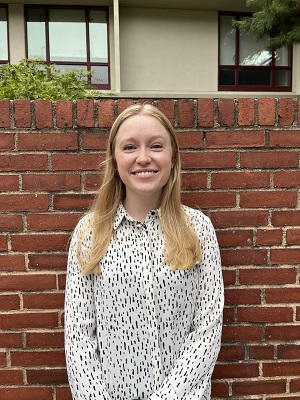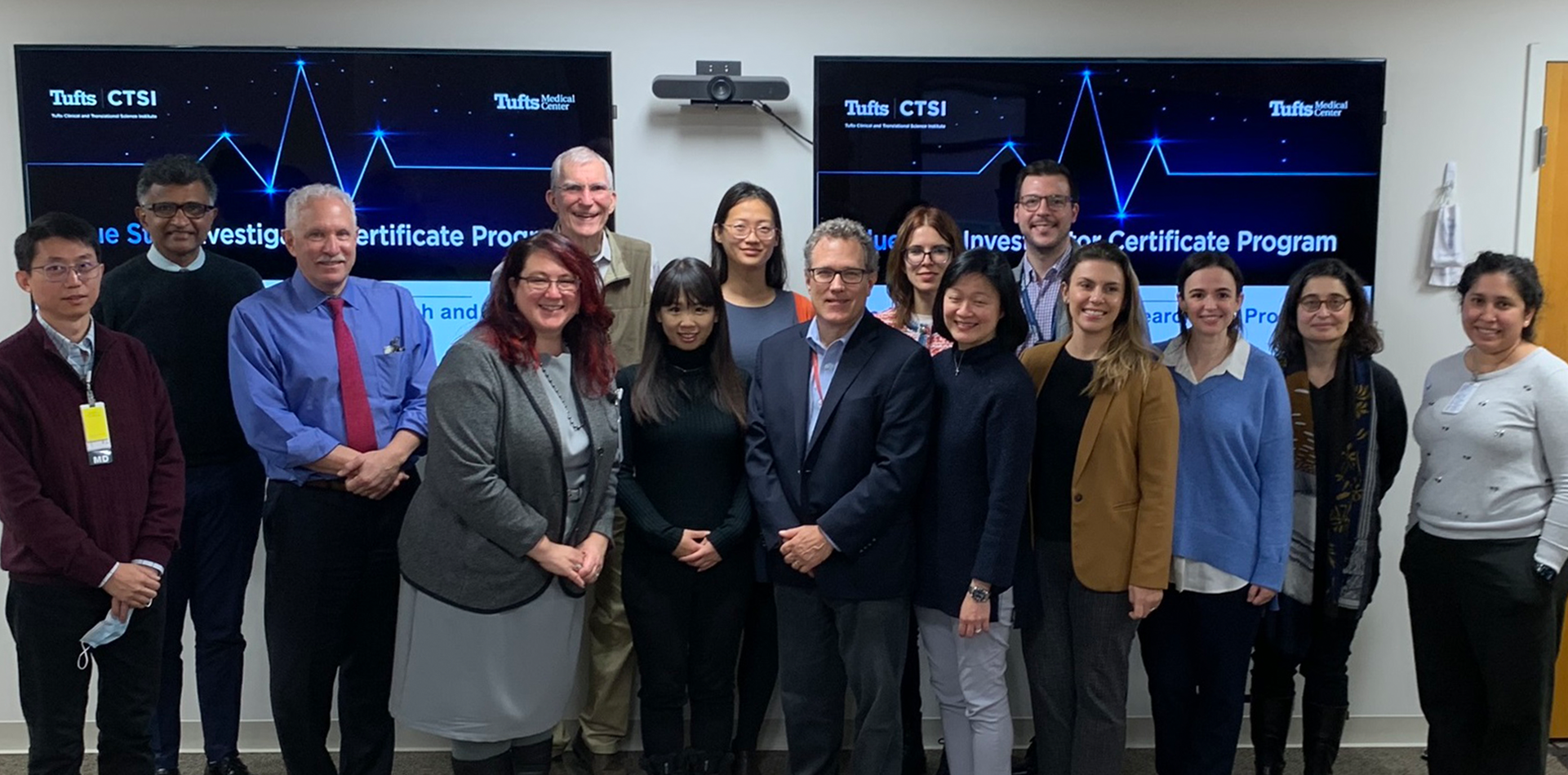Do you have a great idea for a research project? Not sure how to move forward?
Tufts CTSI’s Research Studio Program provides opportunities for investigators to:
- Present their ideas in an interactive, open forum
- Receive feedback, advice, and mentorship from a team of clinical and translational research experts
- Connect with collaborators and find needed research expertise
- Access resources and funds to develop research proposals and submit grants.
How does the Research Studio Program work?
The Research Studio Program is a step-by-step interactive process:
- The research team prepares the projects draft aims or an abstract and submits it to Tufts CTSI’s Research Collaboration Team (RC Team).
- The RC Team invites the research team to prepare a 20-minute presentation about their project idea and the challenges and barriers they are facing.
- The research team attends a one-hour Research Studio (these occur monthly) to present their idea to a panel of clinical and translational research experts. Research Studios consist of a 20-minute interactive presentation, followed by a robust discussion to assess needs and identify solutions.
- The experts provide written feedback on approach strategies, grantsmanship, and connections to resources, and then they work to identify potential collaborators.
- The RC Team may choose to move the presenting project forward into the more intense Mentored Research Studio platform, during which a 3-12 month mentoring plan is created, including:
- An assigned Navigator
- Possible collaborators and funding sources
- Institutional resources and support (which may include planning funds up to $5,000).
- As a final step, the research team prepares a research proposal for submission.
Who is eligible?
Researchers at Tufts CTSI partner and collaborator institutions are invited to participate in the Research Studio Program.
Research Studio Success Stories
The Research Collaboration Team occasionally interviews past Research Studio participants to get feedback on the process and to learn more about how the experience impacted their research. We share them here to help other investigators understand the process and get a sense for the value this could add to their own research programs. To read our Research Studio Success Stories, click here.
Research Studios are open to investigators at all levels as demonstrated by the stories we are choosing to highlight.
If you think you or a faculty member in your department/team could benefit from the interdisciplinary collaborative feedback offered via this mechanism, please reach out to Hannah Santos, Program Administrative Director (hannah.santos@tuftsmedicine.org), with a brief description of your study and any challenges you would like assistance with.
Who has participated in the Research Studio Program?
Past participants of the Research Studio Program include many investigators from 12 Tufts CTSI partner and collaborator institutions:
- Credentialing a cross-species platform to investigate cancer therapy-associated cardiovascular toxicity, Cummings School of Veterinary Medicine at Tufts University, Tufts Medical Center, 2018
- Development of novel behavioral intervention for sustainable weight loss in obese Hispanic adults, Jean Mayer USDA Human Nutrition Research Center on Aging (HNRCA) at Tufts University, 2018
- Enhancing independence using Group-based community interventions for healthy Aging in Elders: The ENGAGE for Brain Health Pilot Study, Jean Mayer USDA Human Nutrition Research Center on Aging (HNRCA) at Tufts University, 2019
- Understanding the role miRNA in adiposity and skeletal muscle loss and functional decline with aging, Jean Mayer USDA Human Nutrition Research Center on Aging (HNRCA) at Tufts University, 2019
- A One Health Approach to Earlier Diagnosis of Cardiac Cachexia in Humans, Cummings School of Veterinary Medicine at Tufts University, 2019
- Quantifying Antimicrobial Use and Risk Factors for Prescribing in a Small Animal Veterinary Referral Hospital, Cummings School of Veterinary Medicine at Tufts University, 2019
- Do Children of Color Have Similar Participation and BMI-z Outcomes in Community-Based Interventions? Friedman School of Nutrition Science and Policy at Tufts University, 2019
- Enhanced Ultrasound Innovation – Clinical uses and Technology advancements, Massachusetts Institute of Technology (MIT), 2019
- Collaborative on Scalable Technology for Aging Research Trials (START), Northeastern University, 2019
- Dissecting Tumor Cell-ECM Interactions in The Primary Tumor and Metastatic Niche in The Healthy and Obese Patient, School of Engineering at Tufts University, 2019
- A Miniaturized Instrument for Absolute Tissue and Cerebral Oximetry, School of Engineering at Tufts University, 2019
- Automated benchmarking of antimicrobial use in dogs and cats using the Observational Medical Outcomes Partnership (OMOP) veterinary common data, Cummings School of Veterinary Medicine at Tufts University, Tufts Medical Center, 2020
- Natural immune-modulating compounds to combat COVID-19 – A pragmatic randomized controlled trial, Friedman School of Nutrition Science and Policy at Tufts University, 2020
- Glucose Lowering for Vision Extension (GLOVE), Jean Mayer USDA Human Nutrition Research Center on Aging (HNRCA) at Tufts University, 2020
- Pathways to zoonotic transmission: influenza at the human-animal interface in rural Zambia, Cummings School of Veterinary Medicine at Tufts University, 2020
- Role of the global splicing factor hnRNP L in cardiac physiology and disease, Tufts Medical Center, 2020
- Disparities from a Distance: A Convergent Mixed-Methods Study from New England, Tufts Medical Center, 2020
- A Benchmark De-identified Echocardiogram Database for Studying Automated Diagnoses, Tufts Medical Center, 2021
- Enabling Comparative Effectiveness Research on NLP-identified Incidentally Discovered Silent Cerebrovascular Disease (SCD) Part II: Developing a generic platform for prospective trials to test interventions for SCD, Tufts Medical Center, 2021
- Food as Medicine for Heart Failure, Tufts Medical Center, 2021
- Fluid Stewardship, Cummings School of Veterinary Medicine at Tufts University, 2021
- Novel Vaccine Immunotherapy Platform for Canine Osteosarcoma, Cummings School of Veterinary Medicine at Tufts University, 2021
- The Impact of Music on Human Locomotor Coordination, Massachusetts Institute of Technology (MIT), 2021
- Improving Discharge Decision-making Among Vulnerable Hospitalized Patients with Injection Drug Use-associated Infections, Maine Medical Center, 2021
- Leveraging the identification of canine osteosarcoma germline susceptibility genes to predict genetic risk in humans and facilitate translational research, The Jackson Laboratory, 2021
- Increasing sex education accessibility for autistic adolescents, School of Arts and Sciences at Tufts University, 2021
- Studying a novel dialogue-based intervention to build trust and vaccine acceptance in Covid-19 vulnerable individuals and communities of color, School of Dental Medicine at Tufts University, 2021
- Multi-Parametric Photoacoustic Imaging Guided Oxygen Enhanced Photo-Chemotherapy Design Strategies for Breast Cancer, School of Engineering at Tufts University, 2021
- Leveraging a cross-species platform to optimize methods for early disease detection and identify strategies for disease progression, Cummings School of Veterinary Medicine at Tufts University, 2022
- Addressing Tobacco Use Behavior in Young Adults with Psychosis, Maine Medical Center, 2022
- Assessing Changes in Real-world Social Behavior, Northeastern University, 2022
- Machine Learning for Computer Assisted Staging Laparoscopy, School of Medicine at Tufts University, 2022
- Produce Prescriptions on Maternal and Birth Outcomes: A Food is Medicine Intervention Among Pregnant Women, Tufts Medical Center, 2022
- Nationwide geographical distribution of Emergency General Surgery Services and outcomes in patients with emergency surgical pathology, Tufts Medical Center, 2022
- Understanding the Impact of COVID-19 on Insurance Churn among Patients with Blood Cancers: a statewide study, Tufts Medical Center, 2022
- Non-Targeted Analysis and Effect-Directed Analysis: Linking Environmental Pollutants to Human Health Studies, Northeastern University, 2022
Ready to enter the Studio?
Research Studios are typically held on the first Thursday of every month (via Zoom) from 3:00-4:00PM.
To present your project idea at an upcoming Research Studio, please contact Hannah Santos, MBA, Program Administrative Director, at hsantos@tuftsmedicalcenter.org.



